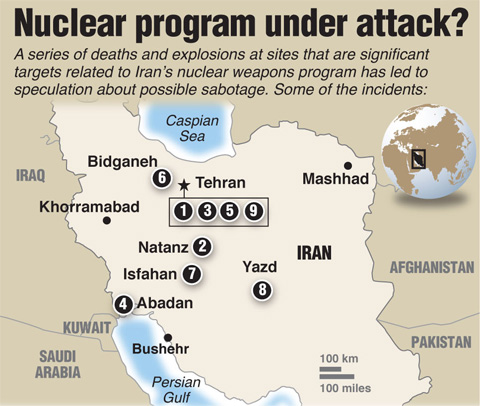 By Sheera Frenkel, McClatchy Newspapers –
By Sheera Frenkel, McClatchy Newspapers –
JERUSALEM — An Iranian scientist working at a key nuclear facility in that country was killed Wednesday in Tehran, the latest act in what appears to be a widening covert effort to disrupt Iran’s nuclear program.
(GRAPHIC: Map of Iran locates killings of nuclear experts, explosions and other incidents at sites important to Iran’s nuclear weapons program; with summary of incidents.)
Mostafa Ahmadi Roshan, a chemistry expert and senior official at the Natanz uranium enrichment facility in central Iran, died when a magnetic bomb was attached to his car by two assailants on a motorcycle, according to Iran’s state news agency, IRNA. Roshan had “organizational links” to Iran’s nuclear agency, including a key role in aspects of the nuclear program, IRNA said.
Israel was immediately suspected of carrying out the attacks. Israeli officials would not confirm or deny whether their agents were involved, but a senior military official who spoke on the condition of anonymity because of the subject offered his approval.
“Whoever carried out this attack, there is no doubt that it is positive, and should be seen as such,” the official said.
Israeli military spokesman Brig. Gen. Yoav Mordechai offered a similar assessment on his official Facebook page: “I don’t know who took revenge on the Iranian scientist, but I am definitely not shedding a tear.”
On Tuesday, Israeli military chief Lt. Gen. Benny Gantz was quoted as telling the Knesset’s Foreign Affairs and Defense Committee that 2012 would be a “critical year” for Iran — in part because of “things that happen to it unnaturally.”
“Many bad things have been happening to Iran in the recent period,” said Mickey Segal, a former director of the Israeli military’s Iranian intelligence department. “Iran is in a situation where pressure on it is mounting, and the latest assassination joins the pressure that the Iranian regime is facing.”
Tehran accused Israel’s Mossad, the CIA and Britain’s MI5 spy agency of carrying out a covert campaign of “terrorism” against Iran.
Wednesday’s killing was the fourth assassination of a scientist involved in Iran’s nuclear program since early 2010. A fifth attempt against the current head of Iran’s atomic agency, Fereydoun Abbasi, failed in November 2010 when Abbasi and his wife narrowly escaped a bomb planted on their car.
A sixth key figure in Iran’s military program, Maj. Gen. Hassan Moghaddam, an Iranian missile expert who was charged with “ensuring self-sufficiency” in armaments, was killed in November in a huge explosion at the Bid Ganeh base outside Tehran. Iranian officials have called that explosion, and another at a nuclear facility in Isfahan, accidents.
The damage caused by Stuxnet, a computer virus that wreaked havoc on the centrifuges in Iran’s uranium enrichment facilities, was likewise played down by the Iranians before they admitted that it had set back their nuclear program.
“Whoever is or isn’t doing these things, they are certainly creating damage to Iran’s nuclear aspirations,” said Ephraim Asculai, an expert on Iran at Israel’s Institute for National Security Studies, a think tank in Tel Aviv. “There is likely a large coalition of people interested in such setbacks continuing to happen.”
The United States, much of Europe, Australia and Israel have been pressuring Iran to halt its program of enriching uranium. While the Iranians have said their enrichment program is intended only to provide fuel for peaceful nuclear power plants, the West fears Iran will be able to enrich uranium to levels required for use on a nuclear warhead.
Last week, Iran announced it was moving some of its enrichment facilities into an underground, bunker-like site south of Tehran called Fordo.
“That does not seem to be what most would call a peaceful step,” an Israeli official said last week during a briefing for reporters. Under the rules of the briefing, the official’s position and name could not be divulged.
Roshan’s precise role at the Natanz facility was unclear. The semi-official Fars news agency described him as the facility’s commercial officer, and other accounts said he was responsible for purchasing and supplying equipment for the facility.
Iranian news accounts noted that the bombing took place on the second anniversary of the assassination of another Iranian nuclear scientist, Massoud Ali Mohammadi, who also was killed by a bomb in Tehran.
Fars reported Wednesday that prosecutors accused the man convicted of killing Mohammadi of having received $120,000 from Israel to undertake the attack and had been trained in Israel “to carry out bomb attacks while riding a motorcycle.”
Motorcycles also were involved in the July 23, 2011, death of Dariush Rezaeinejad, a 35-year-old member of Iran’s Atomic Energy Organization, and the Nov 29, 2010, death of Majid Shahriari, a member of nuclear engineering faculty at Iran’s Shahid Beheshti University.







